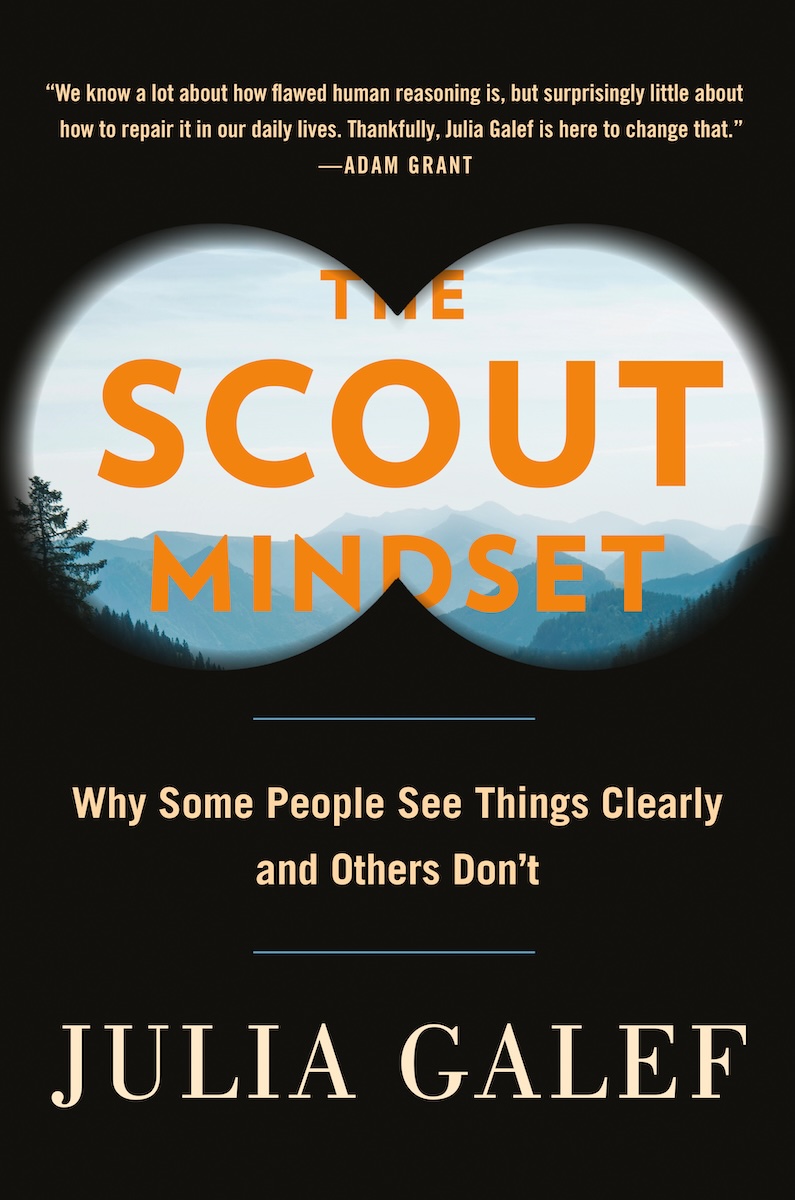Assumed audience: Other orthodox (note the little ‘o’!) Christians, or people interested in what folks like us think. This is an appreciative review, and it absolutely assumes a Christian worldview, and it is about my response to this book as a Christian.

Much better than average in the “how to be a better thinker” space, and worth a read. Her view on “identity” is almost right, but worth a closer look—especially if, like me, you think identity framed rightly is extremely important!
I’d had Julia Galef’s Scout Mindset on my mental to-read list ever since Dan Luu recommended it a few years ago. I don’t always agree with Dan, but I do always find him interesting and thoughtful, so when he recommends a book like this, I pay attention. I read it earlier this week, and I think I largely share Dan’s take on it! This was better than I expected, and I am not only primed to like things like this but I was primed to like this in particular because Dan said exactly that when he recommended it. I still mostly liked it better than I thought I would!
Galef’s book is a quick1 survey of not only how we end up misled by various cognitive biases — familiar territory if you have read Thinking, Fast and Slow or anything from the rationalist community or have heard of the replication crisis — but also helpful ways of actually addressing those biases in very practical terms. As she notes early in the book, plenty of us are aware that we have various biases, but most of us are not very good at doing anything about them.
Galef’s “scout mindset” framing is a helpful one: learning to find truth the most important thing, and to see learning as a victory rather than a defeat. She also does a great job of first understanding why we struggle with this — and at an experiential level, not just a popular cognitive science level.
Where I think she missed a beat was her discussion of “identity” near the end of the book. Her strong emphasis throughout that section is on the problems of strongly-held identities, and how our tendency to invest our sense of our self in that identity can lead us to double down rather than seeking to learn the truth.
I am a devout Christian. There is literally nothing more central and essential to my identity than that, and I believe — having spent a great deal of time in the past few decades thinking about it! — that that is as it should be. Being a Christian means thinking that everyone’s lives are meant to be oriented around, indeed utterly invested in, a dynamic relationship with the God who created all things (wild though that claim may be!). That is what the good life is: knowing and enjoying Goodness in all his glory. If Christianity is true, then that is true! Inverting that, if Christianity is true, and if therefore I should invest all of my identity in being a follower of Christ, then Galef’s claim about identity must be wrong. (Alternatively, Galef might be right and I might be wrong, of course! But if I thought that were so, I would not be a Christian.)
Now, with all of that on the table, it turns out that I think this is only a small quibble. Galef’s comments about identity are actually basically all correct, from the Christian point of view, including as critiques of Christians — because they actually point to two things:
First, it is possible for any and all of us, Christians included, to fix our identities in unhealthy ways. For Christians, it is quite possible and, dare I say it, easy and indeed common, to ground one’s identity not actually in following God but in the fact that I am following God. That reads like a subtle difference, but it is in fact cataclysmically bad for us, because it turns out to be just one more way of running after everything but Goodness himself.
That in turn leads me to the second part: the real problem for all of us, the thing Galef is trying to name as the difference between “soldier mindset” and “scout mindset”, is the old virtue of humility, applied to the intellectual context. Humility loves to learn. A humble person is not threatened by being wrong but rather delights to grow. A properly Christian sense of identity is one that is humble: not prideful (or sensitive!) about being a Christian in contrast to those others, but glad to have found one’s way to the One who is Beauty and Truth and Love — and therefore, not defensive but rather cheerfully ready to learn and to acknowledge our faults and our mistakes and errors. Most of all, strange though it may seem to us, humility is a divine virtue, something God himself displays (though of course humility per se is a rather different thing for one who is omniscient than for a mere mortal) — most of all in the Incarnation.
All of which in the end is to say: Galef is largely right in her recommendations, just not quite for the reasons she offers, as I see it.
I will be happily recommending this book to people going forward. Again: it is a short read, and a good one. Pick it up: you might learn something, not least about how to learn many more things!
Notes
And I mean quick; the audiobook is only 6 hours long,2 so it would be quick to get through whether reading or listening! ↩︎
Because I’m trying out some of the ideas my friend Ben Makuh outlined here, I ended up “reading” the whole thing on audiobook in less than 24 hours. Reading books at
2.5 – 3 × is a heck of a thing. Yes, sorry, this is a footnote to a footnote, back to your regularly scheduled reading. ↩︎